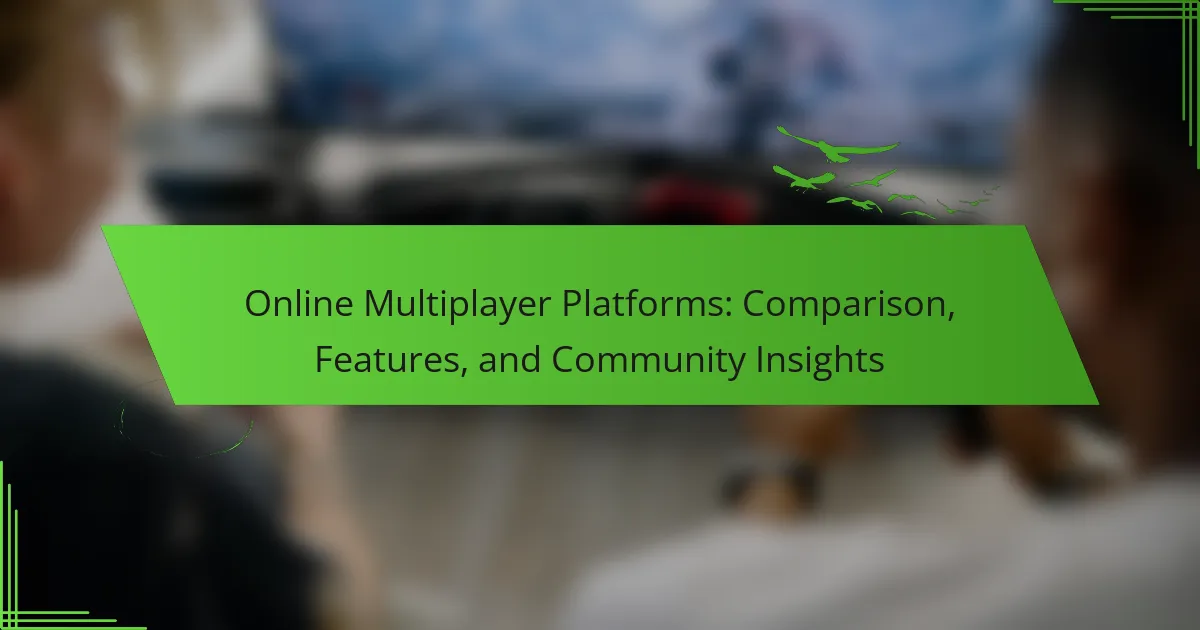Online multiplayer platforms provide real-time interaction and community-driven content, enhancing player engagement. This article compares key platforms like Steam, Xbox Live, and Discord, highlighting their unique features and gameplay styles. It also explores community dynamics, engagement strategies, and rare attributes that enrich the gaming experience. Understanding these aspects can help players choose the right platform for their preferences.

What are the key features of online multiplayer platforms?
Online multiplayer platforms feature real-time interaction, cross-platform compatibility, and community-driven content. They often include voice chat, matchmaking systems, and customizable avatars. These attributes enhance user engagement and provide a dynamic gaming experience. Additionally, some platforms offer unique events and rare in-game items that attract players.
How do user interfaces impact player experience?
User interfaces significantly enhance player experience by promoting engagement and accessibility. Intuitive designs lead to smoother navigation, reducing frustration and allowing players to focus on gameplay. Features like customizable controls and responsive feedback cater to individual preferences, enhancing satisfaction. Community insights reveal that platforms with user-friendly interfaces foster stronger social connections, encouraging collaboration and competition among players.
What role does matchmaking play in gameplay satisfaction?
Matchmaking significantly enhances gameplay satisfaction by ensuring balanced and fair competition. It pairs players with similar skill levels, fostering a more engaging experience. Effective matchmaking reduces frustration and promotes a sense of accomplishment. As a result, players are more likely to remain active and invested in the community.
Which communication tools enhance community interaction?
Online multiplayer platforms enhance community interaction through features like chat systems, voice communication, and social networking tools. These tools facilitate real-time engagement and foster connections among players.
Key platforms include Discord, which offers robust voice and text chat capabilities, and Twitch, allowing live streaming and community interaction through comments. Additionally, platforms like Steam provide forums and group features, enhancing community discussions and collaboration.
The unique attribute of Discord is its server customization, enabling tailored experiences for different communities. In contrast, Twitch’s live interaction creates a dynamic environment for immediate feedback and engagement.
Overall, these communication tools significantly improve community interaction by promoting collaboration, engagement, and social bonding among players.

How do different online multiplayer platforms compare in terms of gameplay styles?
Different online multiplayer platforms offer varied gameplay styles, catering to diverse player preferences. Key comparisons include game genres, community engagement, and platform-specific features.
| Platform | Gameplay Style | Community Engagement | Unique Feature |
|——————|————————|———————-|—————————|
| Steam | Diverse genres | Active forums | Workshop for mods |
| Xbox Live | Competitive gaming | Social features | Game Pass subscription |
| PlayStation Network | Cooperative gameplay | Trophies and rewards | Exclusive titles |
| Epic Games Store | Free-to-play focus | Limited community tools| Free games monthly |
| Discord | Social gaming | Voice channels | Server customization |
| Nintendo Switch Online | Family-friendly | Online tournaments | Classic game library |
Each platform shapes its community and gameplay experience through distinct attributes, enhancing player interaction and enjoyment.
What are the distinctions between competitive and casual gaming environments?
Competitive gaming environments focus on skill-based competition and structured tournaments, while casual gaming emphasizes enjoyment and social interaction. Competitive platforms often feature leaderboards, ranked matches, and strict rules, whereas casual platforms prioritize accessibility and fun. Competitive players seek improvement and mastery, while casual gamers enjoy relaxed gameplay. The community dynamics also differ; competitive environments foster intense rivalries, while casual settings encourage collaboration and friendship.
How do platform-specific genres influence player engagement?
Platform-specific genres significantly enhance player engagement by tailoring experiences to community preferences. These genres foster unique interactions and promote social connections among players. For example, battle royale games on platforms like PlayStation encourage competitive play, while cooperative genres on PC emphasize teamwork. The distinct features of each platform influence gameplay mechanics, accessibility, and community dynamics, ultimately shaping player loyalty and satisfaction.
Which platforms are preferred for cooperative versus competitive play?
Cooperative play is often preferred on platforms like Discord and Steam, while competitive play thrives on platforms such as Xbox Live and PlayStation Network. Discord fosters teamwork through voice chat and community features. Steam offers a wide range of cooperative games and community tools. Xbox Live and PlayStation Network focus on competitive matchmaking and leaderboards, enhancing the competitive experience.

What are the community dynamics within online multiplayer platforms?
Online multiplayer platforms foster diverse community dynamics through collaboration, competition, and social interaction. Players often form alliances or guilds, enhancing engagement and shared experiences. Communication channels, such as chat systems and forums, facilitate relationship building and conflict resolution. Unique attributes, like in-game events, can strengthen community bonds by encouraging participation and teamwork. Additionally, the presence of moderators and community guidelines shapes the environment, promoting positive interactions and inclusivity.
How do player demographics affect community behavior?
Player demographics significantly influence community behavior on online multiplayer platforms. Different age groups, genders, and cultural backgrounds shape interactions, communication styles, and gaming preferences. For instance, younger players often engage more aggressively and competitively, while older players might prioritize collaboration and socialization.
Additionally, diverse demographics can lead to varying levels of inclusivity and toxicity within communities. Platforms that attract a wider range of players tend to foster richer discussions and cooperative gameplay, enhancing overall user experience. Conversely, homogeneous groups may encounter echo chambers, limiting growth and engagement.
Understanding these dynamics allows developers to tailor features and moderation policies, promoting healthier community interactions. This approach can improve retention rates and overall satisfaction among players, ultimately benefiting the platform’s success.
What are common challenges faced by online gaming communities?
Online gaming communities often face challenges such as toxicity, lack of communication, and balancing competitive play. These issues can hinder player experience and community growth.
Toxic behavior, including harassment and trolling, creates a hostile environment. Communication barriers arise from language differences and platform limitations, leading to misunderstandings. Additionally, competitive dynamics can alienate casual players, resulting in a fragmented community.
Addressing these challenges requires effective moderation, inclusive communication tools, and promoting a positive culture. By fostering a supportive environment, online gaming communities can enhance player engagement and satisfaction.
How do platforms foster inclusivity and diversity among players?
Online multiplayer platforms foster inclusivity and diversity by implementing features like cross-platform play, customizable avatars, and community moderation tools. These elements encourage participation from various demographics and promote a welcoming environment. Platforms often host events celebrating diversity, providing players with opportunities to connect and share experiences. Additionally, accessibility options, such as text-to-speech and adjustable difficulty levels, ensure that all players can engage meaningfully, regardless of their background or abilities.

What are the unique attributes of popular online multiplayer platforms?
Popular online multiplayer platforms have unique attributes that enhance user experience. These include cross-platform compatibility, extensive customization options, and strong community engagement features.
Cross-platform compatibility allows players on different devices to interact seamlessly. Customization options enable players to tailor their avatars and gameplay experiences uniquely. Community engagement features, such as forums and in-game events, foster social interaction, enhancing overall enjoyment.
Additionally, some platforms offer unique attributes like exclusive game modes or innovative matchmaking systems that set them apart from competitors. These factors contribute to the popularity and sustained user interest in these platforms.
Which platforms offer exclusive content or experiences?
Several online multiplayer platforms offer exclusive content or experiences. Notable examples include:
1. PlayStation Network – Offers exclusive games and downloadable content for PlayStation users.
2. Xbox Live – Provides exclusive titles and early access to new releases for Xbox players.
3. Steam – Features exclusive indie games and early access titles for PC gamers.
4. Epic Games Store – Hosts exclusive game releases and free monthly games for users.
5. Nintendo Switch Online – Offers classic games and exclusive online features for Nintendo fans.
These platforms enhance user engagement through unique offerings, driving community interaction.
How do platform ecosystems influence game development?
Online multiplayer platforms significantly shape game development by fostering collaboration and innovation. These ecosystems provide developers with tools, resources, and communities essential for creating engaging experiences.
Platforms like Steam, Xbox Live, and PlayStation Network offer unique attributes such as integrated distribution, multiplayer matchmaking, and community features. For example, Steam’s user-generated content and modding support enhance game longevity and player engagement.
The competitive nature of these ecosystems encourages developers to optimize gameplay and user experience. As a result, developers often prioritize cross-platform compatibility and social features to meet player expectations.
Moreover, community feedback and analytics from these platforms help developers refine their games post-launch. This iterative process leads to continuous improvement and adaptation, ensuring that games remain relevant in a fast-evolving market.

What rare features can enhance the online multiplayer experience?
Rare features that can enhance the online multiplayer experience include advanced matchmaking algorithms, cross-platform play, customizable avatars, immersive voice chat systems, dynamic in-game events, and enhanced anti-cheat mechanisms. These elements foster engagement and improve player satisfaction. For example, advanced matchmaking can create balanced teams, while customizable avatars allow for personal expression.
How do cross-platform capabilities impact player retention?
Cross-platform capabilities significantly enhance player retention by fostering a larger, more diverse community. Players can engage with friends across different devices, leading to increased gameplay frequency and social interaction. This interconnectedness encourages longer-term commitment, as players are less likely to abandon games when they can continue playing with their existing social circles. Additionally, cross-platform features can lead to improved matchmaking experiences, as a broader player base allows for better skill-based pairings, further enhancing player satisfaction and retention.
What innovative technologies are shaping the future of multiplayer gaming?
Innovative technologies like cloud gaming, VR, and AI are transforming multiplayer gaming. Cloud gaming allows seamless access to high-quality games without powerful hardware. Virtual reality enhances immersion, creating engaging environments for players. AI-driven matchmaking systems improve player experiences by pairing users based on skill levels. These advancements foster vibrant online communities and elevate competitive play.

What are the best practices for engaging with online multiplayer communities?
Engaging with online multiplayer communities requires active participation and respectful interaction. Prioritize communication by using in-game chat effectively and joining community forums. Build relationships by collaborating with others and participating in events. Share knowledge and resources to foster a positive atmosphere. Always adhere to community guidelines to maintain a respectful environment.
How can players contribute positively to their gaming communities?
Players can contribute positively to their gaming communities by fostering inclusivity, supporting fellow gamers, and promoting respectful interactions. Active participation in community events enhances collaboration and builds friendships. Encouraging fair play and providing constructive feedback can improve overall experiences. Sharing knowledge and resources empowers others, creating a supportive environment. Engaging in discussions about game development can influence positive changes. These actions cultivate a healthy gaming atmosphere, ultimately benefiting all participants.
What common mistakes should players avoid in online multiplayer interactions?
Players should avoid common mistakes like poor communication, neglecting teamwork, and being overly aggressive. These errors can lead to negative experiences and hinder success in online multiplayer interactions.
Effective communication is crucial; players should articulate strategies and provide feedback clearly. Teamwork enhances gameplay, so prioritizing collaboration over individual performance is essential. Additionally, managing aggression and frustration helps maintain a positive atmosphere, fostering better interactions within the community.
Understanding these pitfalls can significantly enhance the gaming experience on online multiplayer platforms.
Which strategies can enhance collaboration and teamwork in games?
Effective strategies to enhance collaboration and teamwork in games include clear communication, role assignment, and regular feedback. Implementing voice and text chat features promotes real-time interaction. Establishing defined roles helps players understand their responsibilities, fostering synergy. Encouraging regular feedback sessions allows teams to address issues and adapt strategies, ultimately improving performance.



